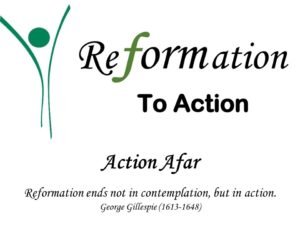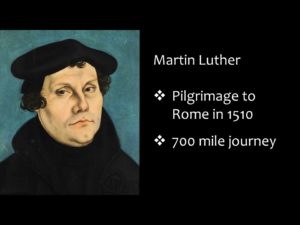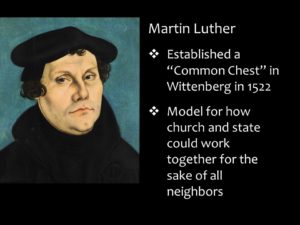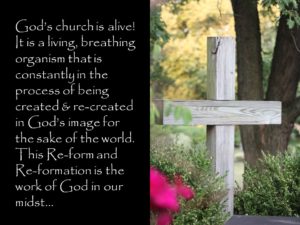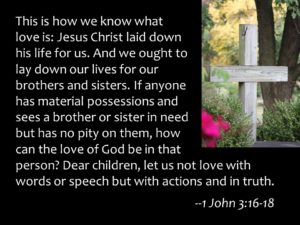Martin Luther traveled on foot as a pilgrim the 700 miles from Germany to Rome. This experience both exhilarated and mortified Luther as he saw juxtaposed the grandness of Rome and the often, awful condition of the people of that great city. We reflect this week on the global nature of God’s church. We reflect on the witness, partnership and solidarity we have with people all over the globe who are serving with us as God’s hands and feet in the world.
There is an old Jewish wisdom story that tells of a rabbi who asked his disciples, “How do you know when the night is giving way and the morning is coming?”
One of the followers stood and said, “Teacher, won’t you know that night is fading when, through the dim light, you can see an animal and recognize whether it is a sheep or a dog?” The rabbi answered, “No.” “Rabbi,” asked another, “won’t you know that the dawn is coming when you can see clearly enough to distinguish whether a tree is a fig or an olive?”
“No,” responded the teacher. “You’ll know that the night has passed when you can look at any man or any woman and discern that you are looking at a brother or a sister. Until you can see with that clarity, the night will always be with us.”
We continue this week with our Stewardship emphasis: “Reformation to Action”. One of the places where we may be in constant need of “Reformation” is in recognizing the humanity of our sisters and brothers – those like us and those who differ from us in all kinds of ways.
One of the opportunities we have to learn about others and experience different ways of being and living is through travel. We can learn a lot about ourselves and about one another – the good and the bad – when we find ourselves in new and unfamiliar places. Ask me sometime about the epic tantrum I threw outside of the Berlin Zoo train station. Not one of my finer moments – but certainly an opportunity for me to learn and grow…
As we have studied Martin Luther’s life more in depth this year, we have learned that one of the formative experiences of Luther’s life was his pilgrimage to Rome. That 700 mile trip on foot from Germany to Rome both exhilarated and mortified Luther. He saw the great buildings and the grandness of the city as tourists have for centuries, but he also witnessed first-hand the corruption and the lack of concern that the church seemingly had for the poor and the suffering in its midst.
Luther took this experience home with him to Germany and I have to believe that it contributed to the clarity he had about getting back to the basics of scripture, to the core of Jesus’ teaching.
I share today’s passage from 1 John, it reads:
This is how we know what love is: Jesus Christ laid down his life for us. And we ought to lay down our lives for our brothers and sisters. If anyone has material possessions and sees a brother or sister in need but has no pity on them, how can the love of God be in that person? Dear children, let us not love with words or speech but with actions and in truth. (1 John 3:16-18)
For Luther, the work of Christ was central and essential to the foundation and practice of the church and being a Christian. Let me be clear on a point that Luther would have been sure to emphasize. The love that we have experienced, the love that we are able to share with actions and in truth – the love that is spoken about in these scripture verses – it comes from only one place and that is from God. It comes first from God.
The sharing of God’s love was not just a theological construct for Luther – and one of the ways that sharing God’s love became practical and real in Luther’s world was in something that became known as the “Common Chest”. And I am grateful for Gloria Dei’s Servant & Justice Team for lifting up this history for us.
As a way for the government to respond to the needs of the vulnerable. Luther and others in Wittenberg established a “Common Chest” in 1522. The chest offered financial support for orphans and poor children, dowry support for poor women, interest-free loans, refinancing for high-interest loans, education or vocational training for poor children and vocational retraining for adults. Health care was added later, as the Common chest funded the services of a town physician and paid the cost of hospital care and other treatments.
The Wittenberg Common Chest order spread to other cities and towns and became a model for how church and state could work together for the sake of all neighbors.
[Excerpt from Hand in Hand: ELCA action, accompaniment and advocacy, Living Lutheran, October 2017]
And this was the 16th century – it is just remarkable to me that in the midst of everything else that Luther and the reformers had set into motion, that there was still intentional care being taken for the least of these in their midst. Again, the legacy we have been given as Lutheran Christians is amazing.
As we reflect on this legacy in this season of Stewardship, we have invited Gloria Dei members to share their own experiences of being changed or even Re-formed in their thinking or their outlook on the world. Last week Briana and Julia Schanke shared their experience of being involved in youth ministry, especially with the mission trips and youth gatherings.
Hopefully, you also were able to read Mary Jo Hunsberger’s story in this week’s Stewardship letter that you either received in an email or your mailbox – as she shared about an amazing “walk with God” that she experienced in her travels.
This week, we turn our eyes to “Action Afar” – to a more global perspective and view. I am grateful to Mark Fisher for his willingness to come and share his experience with us this morning.
God’s church is alive! It is a living, breathing organism that is constantly in the process of being created and re-created in God’s image for the sake of the world. This Re-form and Re-formation is the work of God in our midst – and it has the power to shape us and change our view and understanding of the world around us – and what God is calling us to be and to do.
Amen.
Rev. John Berg
Gloria Dei Lutheran Church, Northbrook, IL

